Related Research Articles

Night of the Living Dead is a 1968 American independent horror film directed, photographed, and edited by George A. Romero, written by Romero and John Russo, produced by Russell Streiner and Karl Hardman, and starring Duane Jones and Judith O'Dea. The story follows seven people trapped in a farmhouse in rural Pennsylvania, under assault by flesh-eating reanimated corpses. Although the monsters that appear in the film are referred to as "ghouls", they are credited with popularizing the modern portrayal of zombies in popular culture.
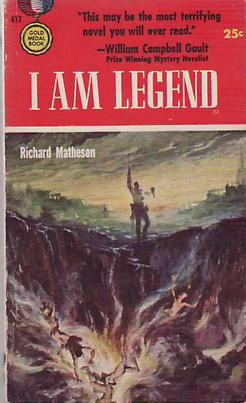
I Am Legend is a 1954 post-apocalyptic horror novel by American writer Richard Matheson that was influential in the modern development of zombie and vampire literature and in popularizing the concept of a worldwide apocalypse due to disease. The novel was a success and was adapted into the films The Last Man on Earth (1964), The Omega Man (1971), and I Am Legend (2007). It was also an inspiration for George A. Romero's Night of the Living Dead (1968).
Resident Evil, known as Biohazard in Japan, is a Japanese horror game series and media franchise created by Capcom. It consists of survival horror, third-person shooter and first-person shooter games, with players typically surviving in environments inhabited by zombies and other mutated creatures. The franchise has expanded into other media, including a live-action film series, animated films, television series, comic books, novels, audiobooks, and merchandise. Resident Evil is the highest-grossing horror franchise.

Dawn of the Dead is a 1978 zombie horror film written, directed, and edited by George A. Romero, and produced by Richard P. Rubinstein. An American-Italian international co-production, it is the second film in Romero's series of zombie films, and though it contains no characters or settings from the preceding film Night of the Living Dead (1968), it shows the larger-scale effects of a zombie apocalypse on society. In the film, a phenomenon of unidentified origin has caused the reanimation of the dead, who prey on human flesh. David Emge, Ken Foree, Scott Reiniger, and Gaylen Ross star as survivors of the outbreak who barricade themselves inside a suburban shopping mall amid mass hysteria.
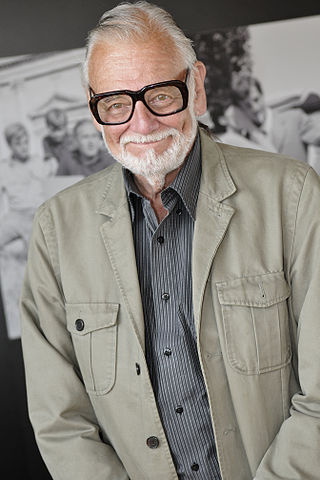
George Andrew Romero Jr. was an American-Canadian film director, writer, editor and actor. His Night of the Living Dead series of films about a zombie apocalypse began with the original Night of the Living Dead (1968) and is considered a major contributor to the image of the zombie in modern culture. Other films in the series include Dawn of the Dead (1978) and Day of the Dead (1985).

An exploitation film is a film that tries to succeed financially by exploiting current trends, niche genres, or lurid content. Exploitation films are generally low-quality "B movies", though some set trends, attract critical attention, become historically important, and even gain a cult following.
"Treehouse of Horror III" is the fifth episode of the fourth season of the American animated television series The Simpsons. It originally aired on Fox in the United States on October 29, 1992. The third annual Treehouse of Horror episode, it features segments in which Homer buys Bart an evil talking doll, Homer is a giant ape who is captured by Mr. Burns in a parody of the 1933 version of King Kong, and Bart and Lisa inadvertently cause zombies to attack Springfield.

George Donald Mancini is an American screenwriter, director, and producer. He is best known for creating and writing the Child's Play franchise (1988–present).
Living Dead, also informally known as Of The Dead is a blanket term for the loosely connected horror franchise that originated from the 1968 film Night of the Living Dead. The film, written by George A. Romero and John A. Russo, primarily focuses on a group of people gathering at a farmhouse to survive from an onslaught of zombies in rural Pennsylvania. It is known to have inspired the modern interpretation of zombies as reanimated human corpses that feast on the flesh and/or brains of the living.

Erotic horror, alternately called horror erotica or dark erotica, is a genre of fiction in which sensual or sexual imagery are blended with horrific overtones or story elements for the purpose of sexual arousal. Horror fiction of this type is most common in literature, film and video games.
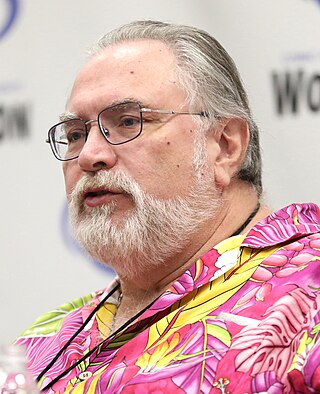
Jonathan Maberry is an American suspense author, anthology editor, comic book writer, magazine feature writer, playwright, content creator and writing teacher/lecturer. He was named one of the Today's Top Ten Horror Writers.

A zombie is a mythological undead corporeal revenant created through the reanimation of a corpse. In modern popular culture, zombies are most commonly found in horror genre works. The term comes from Haitian folklore, in which a zombie is a dead body reanimated through various methods, most commonly magical practices in religions like Vodou. Modern media depictions of the reanimation of the dead often do not involve magic but rather science fictional methods such as fungi, radiation, gases, diseases, plants, bacteria, viruses, etc.
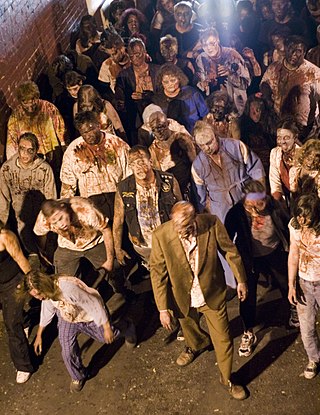
Zombie apocalypse is a subgenre of apocalyptic and post-apocalyptic fiction in which society collapses due to overwhelming swarms of zombies. Typically only a few individuals or small bands of human survivors are left living. In some versions, the reason the dead rise and attack humans is unknown, in others, a parasite or infection is the cause, framing events much like a plague. Some stories have every corpse zombify, regardless of the cause of death, whereas others require exposure to the infection, most commonly in the form of a bite.

FantaCo Enterprises is an American comic book store and publishing company founded and created by Thomas Skulan and based in Albany, New York. As a publisher, FantaCo was known for its idiosyncratic line-up of mostly black-and-white titles, including the humorous Hembeck Series and the horror title Gore Shriek. FantaCo also published "The Chronicles Series", which cataloged top-selling Marvel Comics titles. In its later years, FantaCo published mostly horror comics and a small number of "good girl art".
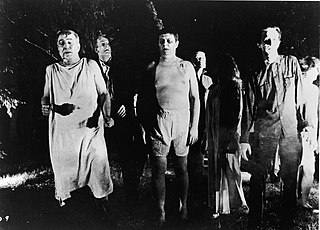
A zombie film is a film genre. Zombies are fictional creatures usually portrayed as reanimated corpses or virally infected human beings. They are commonly portrayed as cannibalistic in nature. While zombie films generally fall into the horror genre, some cross over into other genres, such as action, comedy, science fiction, thriller, or romance. Distinct subgenres have evolved, such as the "zombie comedy" or the "zombie apocalypse". Zombies are distinct from ghosts, ghouls, mummies, Frankenstein's monsters or vampires, so this article does not include films devoted to these types of undead. I am Legend and World War Z are the highest grossing zombies movies of all time.
Night of the Living Dead is a zombie horror media franchise created by George A. Romero beginning with the 1968 film Night of the Living Dead, directed by Romero and cowritten with John A. Russo. The franchise predominantly centers on different groups of people attempting to survive during the outbreak and evolution of a zombie apocalypse. The latest installment of the series, Survival of the Dead, was released in 2009, with a sequel, Twilight of the Dead, in development. This would be the first film in the series not directed by George Romero, who died on July 16, 2017.
Queer ecology/ Queer ecologies is an endeavor to understand nature, biology, and sexuality in the light of queer theory, rejecting the presumptions that heterosexuality and cisgenderedness constitute any objective standard. It draws from science studies, ecofeminism, environmental justice, queer epistemology and geography. These perspectives break apart various "dualisms" that exist within human understandings of nature and culture.
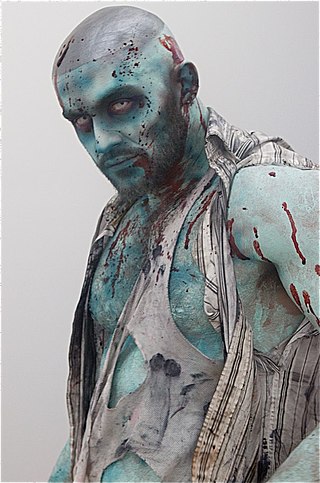
Zombie pornography is a subgenre of pornography involving zombies, a type of undead being with uncontrollable appetites but no personal desire. Films in the subgenre emerged during a surge in the 1980s Italian sexploitation industry and saw minor release in the United States the next decade, but their use of zombie sex was primarily to shock the viewer. Film-maker Bruce LaBruce released Otto; or, Up with Dead People (2008) and L.A. Zombie (2010), two prominent gay zombie porn films seen by scholars as subverting homophobic tropes about gay life; in the films, zombification is physically similar to AIDS, a disease typically associated with gay men. While zombie porn may be appealing to some because it breaks taboos related to necrophilia, and plays with male viewers' fear of castration, zombies are also ferocious creatures that can destroy their sexual partners. As a result, the genre has remained largely unappealing.
References
- ↑ McGlotten, Shaka; Jones, Steve (2014). Zombies and Sexuality: Essays on Desire and the Living Dead. Contributions to Zombie Studies (new, illustrated ed.). McFarland. p. 12. ISBN 9781476617381.
- ↑ Rowan, Terry (2012). The Book of the Undead A Zombie Film Guide. p. 108. ISBN 9781257129454.
- ↑ Piepenburg, Erik (June 28, 2017). "A Salute to Stomach-Churning Pleasures: Horror on VHS". The New York Times. Retrieved 2020-06-26.
- ↑ Giffney, Noreen; Hird, Myra J. (2008). "Necrosexuality". Queering the Non/human. Queer interventions (new, illustrated ed.). Ashgate Publishing. p. 347. ISBN 9780754671282.
- ↑ Hantke, Steffen (2007). Caligari's Heirs: The German Cinema of Fear After 1945. University of Michigan: Scarecrow Press. p. 200. ISBN 9780810858787.
- ↑ Black, T. (April 26, 2017). "Necro Files 3000 (Review)". Horror Society. Retrieved 2020-06-26.